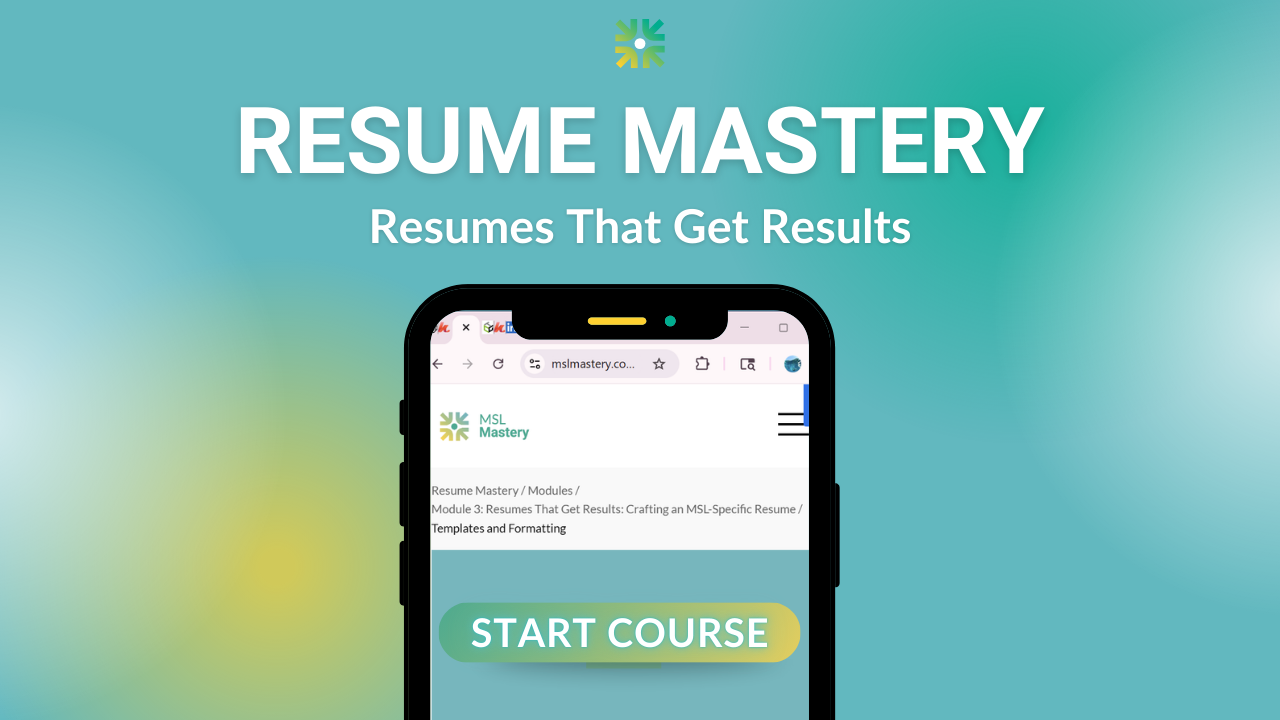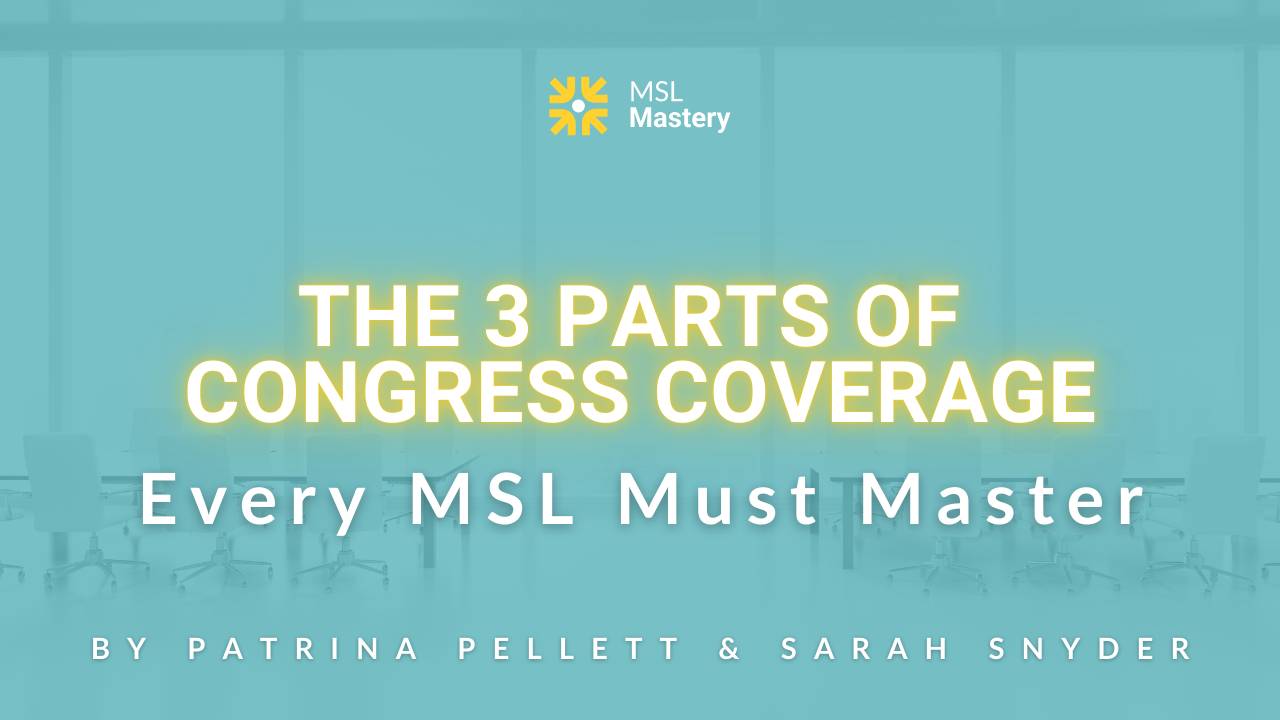
How To Quantify Your Resume: A Medical Affairs Resume Tip
Oct 12, 2025You’ve sent out 30 MSL job applications.
Crickets. The problem probably isn’t your experience: it’s your resume.
If you are applying for jobs and not hearing anything back, it might be time to revamp your resume. When an academic decides to switch to the dark side (industry), figuring out how to get a real job is hard. Especially the resume part. And yet so important. Most academic CVs are impressive, just not in the way industry hiring managers care about. Your resume can get you through the door and help you stick out in an interview. People always say, "Quantify your resume." Keep reading to learn about my resume struggles and how to quantify your resume.
This tip is great for both aspiring MSLs trying to land their first role or a more experienced professional looking to transition. Having good quantification in your resume will help!
My Struggles Turning an Academic CV into an Industry Resume
About 7 months before my PhD graduation, I got serious about my job search, and I was stressed! I didn’t want to take the traditional academic route and get a postdoc. But I had no idea how. I thought,
“Omg, I have to make an industry CV. I don’t even know what that is.”
My current academic CV was awesome and 7 pages long. I highlighted every publication, poster presentation, and award with gusto.
Like any good PhD student, I studied. The Career Services Center at my university had a program called “Turning that PhD into a J.O.B.” The best part of this program was that they gave us books. This book in particular saved my life: “So What Are You Going to Do With That?: A Guide for M.A.’s and Ph.D’s Seeking Careers Outside the Academy” by Susan Basalla.
The book had a side-by-side comparison of an academic CV and an industry resume. I completely wore out this section, making my own resume. I furiously flipped back and forth, trying to figure out how to make my CV industry-ready. I spent so much time on my resume, and it turned out pretty alright. But wow, it took forever!
Here is my top learning from my time-consuming adventures in making a resume to get an industry position. Aspiring MSLs and Medical Affairs folks looking to change roles can apply this tip (quantify your resume) to revamp their resumes and land an amazing new role.
Download the Resume Revamp Checklist for more ways to improve your resume!
If you're applying to MSL roles and not hearing back, you might need more than just a checklist.
Land Interviews with The MSL Mastery Resume Course
Get step-by-step guidance, insider tips, and real examples in our Resume Mastery Course, designed specifically for aspiring MSLs:
→ A resume template that gets call backs
→ A proven strategy specifically for aspiring MSLs
Stop guessing. Learn the exact resume formula our MSL grads used to land interviews at Novartis, Genentech, AstraZeneca, and more.
Medical Affairs Resume Tip: How to Quantify Your Resume
Tip #1: Quantify Your Resume
Hiring managers want to see results. Numbers help demonstrate results. Look through your resume and think about places you can add numbers. I dug out my resume I used to get an industry position out of my PhD. In my “Research Experience” section, I mentioned that I “generated over 50 constructs.” (See the image below.) Multiple hiring managers mentioned this during interviews. Numbers stick out and people remember you.

Here is a more MSL-relevant example. MSLs teach a lot and need to be good communicators. Hiring managers want to see that you have great communication skills and can feel comfortable putting you in front of HCPs. Avoid vague terms to describe your teaching experience, like “Extensive teaching experience.” Put some numbers on this! Here is my example (see red box):

Want help translating your lab or teaching experience into resume language? The Resume Course shows you how to turn vague job duties into quantifiable impact that hiring managers remember.
Tip #2: Make Educated Guesses on Your Activities to Quantify Your Resume
You are probably thinking, “But I don’t know how many XYZ things I did. How can I add a number to it?” Figure out the averages and come up with something that you are comfortable with. Don’t lie. You know how much of something you were doing on average. Find a number you are comfortable with and add that to your resume.
In my example above, was it exactly 8 hours of lab each week and 90 students? Probably not, but I know that on average, I taught 8 hours of lab per week with a lab size of around 30 students and did this for 3 semesters.
Conclusion: How to Quantify Your Resume
Mastering your resume is challenging, but with time and practice, you will get better at it! Utilize these tips on how to quantify your resume to help it stick out. Adding numbers where applicable helps you "show" and not "tell" your experience.
If you are looking for more ways to revamp your resume, check out the Resume Revamp Checklist resource.
Resources to Improve Your MSL Resume
Whether you're just starting your MSL journey or refining your resume to land your next role:
- Resume Mastery Course: templates, and expert guidance
- Hyper-personalized resume writing
Resumes are just the beginning. If you're serious about breaking into Medical Affairs, the Aspire MSL Program gives you the tools, strategy, and confidence to land the role. Resume support, LinkedIn optimization, interview prep: it’s all inside the Aspire MSL Program.
Take action today. Don't leave your career in someone else's hands. Your future role is waiting.
FAQs: From Clinical / Academic to MSL: Common Questions
1. What’s the biggest mistake professionals make in their resumes when transitioning into Medical Affairs?
Whether you’re an MD, PharmD, PhD, NP, PA, or OD, many make the mistake of treating their resume like a full CV or clinical résumé: listing every publication, procedure, or rotation. Hiring managers don’t want your life story. They want to see impact, evidence that you moved things forward.
So instead of “Performed clinical rounds in hospital X,” try “Managed care of 30+ patients daily, led protocol-compliance initiative that reduced readmission by 10%.”
2. How do you quantify your role if you haven’t worked in industry before?
Think in terms of scale, frequency, or reach. In academic or clinical settings, you’ve done measurable work. Examples:
-
Number of patients you saw, protocols you ran, procedures taught
-
Number of trainees mentored or workshops led
-
Hours per week you spent on a project, or number of collaborators
-
Growth in numbers (e.g. “publication count increased by 40% over 2 years”)
Even if exact numbers elude you, best-estimate conservatively is better than vague statements.
3. What if I’ve already applied to roles and heard nothing back?
Don't give up yet. BUT don't keep doing the same thing and expect different results. You may need to highlight your transferable skills better. Consider using Mira, our medical affairs chatbot, to test your resume keywords, prompts, or draft versions.
Here’s a free prompt you can try inside Mira:
“Here’s my current résumé (paste). I’m transitioning from [your background, e.g. NP, MD, PhD] into medical affairs / MSL. Suggest 3-5 quantifiable bullet edits using my clinical or academic experience that highlight impact and relevance.”
You’ll get instant ideas, which you can then refine.
Get more ideas of how to use ChatGPT for your job search here.
4. How long does it take to land a medical affairs / MSL role?
It varies widely, from several weeks to 6+ months. It depends on:
-
Therapeutic area
-
Your background and how optimized your LinkedIn profile is
-
Geographic location and employer hiring cycles
-
How aligned your networking, resume, and outreach are
The faster path often comes from combining strong quantification + targeted outreach + strategic networking.
5. Should I include clinical experience, publications, or teaching on this resume?
Yes, absolutely when relevant. These experiences demonstrate scientific credibility, communication skill, and leadership - all qualities employers look for.
6. Where can I learn more?
Here are some of our favorite resources:
-
95% of MSL Candidates Overlook This Trait — And Don’t Get Hired
- What is an MSL? The 2025 Career Guide
We Spill the Medical Affairs Tea Every Friday
Real talk, career tips, and insider gems we usually save for training clients.
It’s like brunch with your smartest friend, but in your inbox.
📬 Fridays at 9am CT.
👉 Join the party below!





